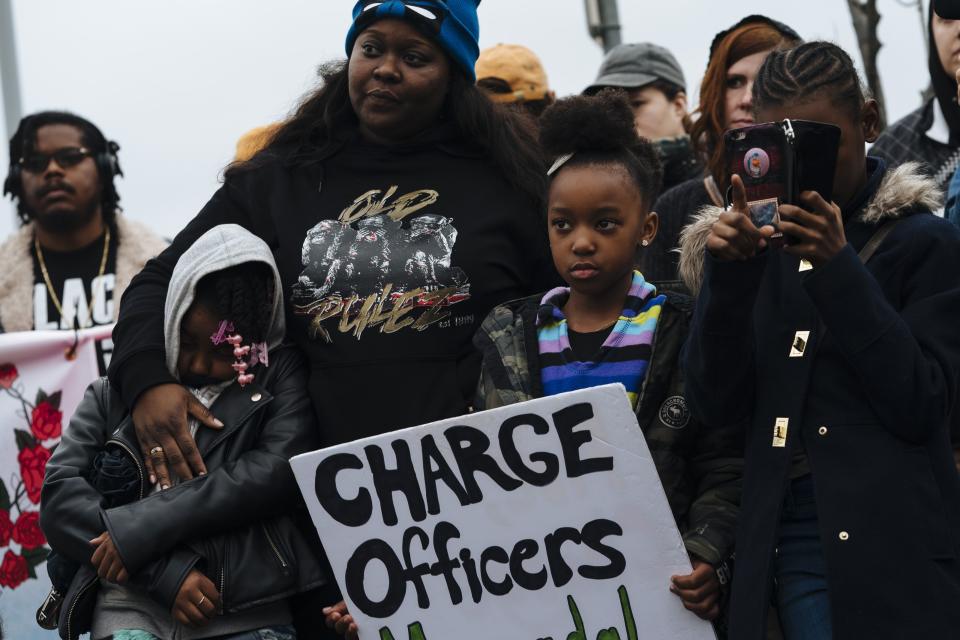Stephon Clark case exemplifies why communities don't trust cops: Readers sound off

On Tuesday, California's attorney general doubled down on the decision made by the Sacramento district attorney not to file criminal charges against two police officers who last year fatally shot Stephon Clark, a 22-year-old unarmed black man .
Facebook comments edited for clarity and grammar:
Stephon Clark was murdered in his grandmother’s backyard for holding a cellphone. The district attorney received $13,000 from police unions days after the shooting and now we learn she will not charge the officers.
— Tim Wilson
Details the cops only knew in hindsight are completely irrelevant in the determination of whether or not a shooting was justified. The only thing law enforcement knew was that they were responding to an individual breaking windows.
The implication that people who are uncooperative with police for whatever reason deserve extrajudicial execution is absurd. By definition, police are going to sometimes deal with people who are uncooperative. I think it’s irrational to expect a police officer to only act in accordance with the law when he or she is confronted with a cookie-cutter situation.
Mistrust of police happens because of consistent trends in the miscarriage of justice by cops, district attorneys and government for certain minorities and their communities. Grassroots efforts by police chiefs and law enforcement agencies are needed to reestablish ties and build trust in the communities they serve.
— Zheng Chen

Need to know all the facts but I just don't understand why people dont obey orders from cops. Even if you think the order is not valid or racist, comply. Can deal with later. Always turns out bad when ignore cops orders and disrespect cops.
— Scott Simpson (@scottsimpsonlaw) March 6, 2019
I don't agree with firing seven shots but the fact is that you are not in the policeman's shoes. It is no different than soldiers in combat. They are trained to protect themselves if threatened. Unfortunately, that often requires split-second decision-making to take the perceived threat down. The police can't wait for the threat to shoot first. They want to go home after their shift like anyone else. They also have to live with the shooting the rest of their lives.
— Bruce Passer
What is the problem with them? Nobody is willing to charge these trigger happy cops with anything. (even though they should be charged with murder) Cowards
— cilae2000 (@stockbur492) March 5, 2019
Once again, it's apparently okay for police to shoot first, and ask no questions later. #TakeAKnee America, our country is seriously injured.
— RoastPorkins (@RPorkins) March 2, 2019
Change the laws that protect cops. They should have to face the same laws we do. Not one set for them and another for us.
— DN Wright
Rules to the use of deadly force is required especially for unarmed arrests.
— American Patriot (@JohnMShelley) March 6, 2019
Letter edited for clarity and grammar:
The USA TODAY article, "A spark on social media lit a firestorm," published on Feb. 22, was well-written and well-balanced even though it did not say anything new. But it did sum up the premature outrage over an encounter between a Native American and a group of catholic school kids well: “social media and the news media can be exploited to fuel outrage in a deeply divided country, even as the full picture of the event is still forming."
This article could have been written, with very little change, about the premature reaction to police shootings and to decisions by officials. As a retired cop of 32 years, I've witnessed the often premature firestorm. Activist groups charge down streets a few hours after a shooting, demanding the officers' hides when investigations are often just starting. And sometimes the news media is prematurely leading the charge.
Former NFL quarterback Colin Kaepernick has also led the way. He is being held up as an American hero for kneeling during the national anthem and wearing socks that depict cartoon pigs as police officers.
Bill Sanders; Gold River, Calif.
Want to sound off about what's happening with police? Email letters@usatoday.com or use #policingtheusa on Twitter. See something in your neighborhood (good or bad) involving police? Tell us. Share your experiences with law enforcement and the justice system by calling our hotline at 540-739-2928.
This article originally appeared on USA TODAY: Stephon Clark case exemplifies why communities don't trust cops: Readers sound off

